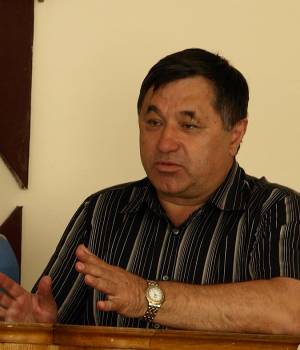Infectious silence

Regular media monitoring keeps us informed about the ever increasing number of issues muffled on Ukrainian television. The perennial problem with constantly pointing to the illness, of course, is that end up quoting the statistics while scarcely reacting. How much can you write, speak out, or sign various appeals if there is no response? Or worse, when there’s only cynical manipulation?
There were three events during the last month which had direct bearing on freedom of expression in Ukraine.
A month before the twelfth anniversary of Georgy Gongadze’s murder, the authorities enacted the final stage in their shamefully cynical pretence. In theory it was they who had sought charges against former President Kuchma of involvement in the murder of the journalist, only to be thwarted by Ukraine’s Constitution. Or, more precisely, by the interpretation of the relevant norm from the increasingly subservient Constitutional Court. It was that illustrious body which in October 2011 found that criminal charges could not be based on information which had not been obtained by an investigative body. The fact that in 2005 the European Court of Human Rights ordered the Ukrainian authorities to carry out a proper investigation and find those who had ordered the killing was not seen as important. No, Melnychenko’s tapes which directly implicate Kuchma were not obtained by a body empowered to obtain such evidence and therefore Kuchma couldn’t be touched. Unlike Melnychenko himself, who now awaits an Italian court’s decision as to whether he can be extradited to face criminal charges in Ukraine effectively over unauthorized surveillance..
Whether the authorities seriously expected praise for their “solving” of the murder of Kharkiv journalist Vasyl Klymentyev is not clear. Only the President’s Press Secretary Daria Chepak waxed lyrical about the “achievement”. Those who had followed the case immediately noticed that the supposedly new development was virtually identical to the conclusions drawn by the same investigators in March 2011. Not that many were following the case. The second anniversary of the disappearance of the Chief Editor of the Kharkiv newspaper Novy Styl passed, at least in the public sphere, unnoticed.
The authorities have virtually not responded at all to the murder of the well-known Dnipropetrovsk environmentalist and civic activist Volodymyr Honcharenko. There were no words of sympathy, no promises to investigate the crime, bring those responsible to justice. It would be rash and unwarranted to suspect officialdom of a sudden aversion to lies. No, they refrained from empty promises because they could afford to do so. The media has not poisoned their lives, has not asked uncomfortable questions.
It’s not that they have completely ignored what happened. They reported that the well-known environmentalist had been killed, even that he had been brutally attacked just 4 days after giving a press conference at which he revealed information about 180 tonnes of chemically contaminated scrap metal in a district of Kryvy Rih in the Dnipropetrovsk oblast.
Beyond Dnipropetrovsk almost all media publications restricted themselves to one report. It is indicative that considerably more attention to the events was paid by the English-language newspaper Kyiv Post, and Radio Svoboda. Virtually nobody reported the statement issued by the human rights organization Article 19 which is a great shame. The latter’s focus was absolutely spot on:
“ARTICLE 19 calls on the Ukrainian government to publicly condemn the killing of environmental information activist, Volodymyr Honcharenko as a crime against free speech and ensure that those responsible are brought to justice via an independent and transparent process”
Volodymyr Honcharenko has not been forgotten. His colleagues and many other volunteers have started up two “Honcharenko Team” social network pages to spread information about the investigation and about the last case he was dealing with and the direct danger it poses to people’s lives.
The problem is now in being heard. While Volodymyr Honcharenko was alive, he quite often gave live interviews, press conferences, etc. He was killed and the situation has radically changed. Whether there have been actual instructions, or whether television channels are simply playing careful and not sticking their necks out is not yet entirely clear.
The “Honcharenko Team assert that “the regional authorities as a whole, and the authorities of Kryvy Rih in particular, are, through their actions, protecting the interests of the Ukr-Euro company (the owners of the above-mentioned scrap metal) which is manipulating public opinion and distracting the public’s attention from the brutal killing of Honcharenko.”
They are willing to provide evidence and certainly don’t expect to be believed on their word alone. They are simply asking people to check the information, carry out investigations, or at least pay heed.
What Georgy Gongadze and Ihor Alexandrov were once committed to providing for their readers. And what Volodymyr Honcharenko devoted so much of his life to.
It’s certainly difficult not to shudder when we put these names and the names of slain colleagues together. Not easy either to quell the shame and fear at the thought of meekly agreeing to be silent.





